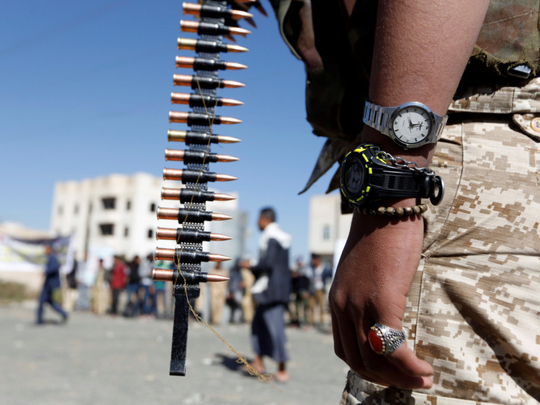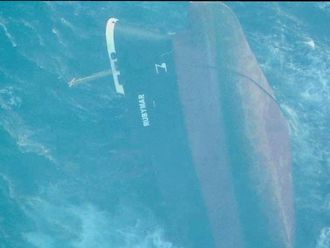
Beirut: Al Houthi militants who control Sana’a, the capital of Yemen, have tightened their grip on the city and its people in recent weeks, shutting off access to the internet, blocking social media sites and sending gunmen to raid the homes of anyone they suspect of opposing them.
Hundreds of people have been detained, and prices for basic goods such as food and fuel are soaring, threatening to exacerbate an already dire humanitarian crisis.
The power consolidation by the militants, who are aligned with Iran and known as Al Houthis, is a grim new chapter in the war in Yemen and highlights the tremendous barriers facing international efforts to end it.
This month began with an event that could have altered the course of the war: the killing by Al Houthi forces of Ali Abdullah Saleh, the former president of Yemen who had been the militants’ most important ally in the war.
Saleh, who had served as president for three decades before being pushed out in 2012 after an uprising, was a towering figure in Yemeni politics.
In allying with Al Houthis, an unsophisticated movement from northern Yemen, Saleh provided both political acumen and well-trained, well-equipped fighting forces.
Al Houthi alliance with Saleh’s political party, the General People’s Congress, also gave the militants a wider political base than they otherwise would have had.
But in the end, Saleh denounced Al Houthis and said he wanted to turn a “new page” with Saudi Arabia to end the war.
On December 4, Al Houthis killed him for it.
Saudi Arabia and Al Houthis’ other enemies had long sought to split Saleh and the militants, believing that Al Houthis’ forces would fold easily if Saleh’s loyalists turned against them.
But they were unprepared to capitalise on the situation when it actually happened, and Al Houthis have since done all they can to make sure that Saleh’s remaining loyalists pose no threat.
That has led to the crackdown in Sana’a, and other Al Houthi-controlled areas, with Al Houthi fighters arresting hundreds of Saleh’s loyalists and locking them up, said Adel Al Shoga, a leader of Saleh’s party, who is in Cairo.
About 45 of the party’s top 50 leaders are still in Sana’a, he said, and about 15 of them are under house arrest. The rest are in hiding, looking for ways to sneak themselves and their families out of the city.
“They are living in fear,” Shoga said of his wife and children, who remain in the city. “They spend every minute wondering if they will get caught.”
Saleh’s killing came after he had established new contacts with Saudi Arabia and its allies, which hoped that he and his loyalists could turn the tide of the war. Even Western nations such as the US had hoped that Saleh’s party could play a role in negotiations to end the conflict, which began in 2014 when Al Houthis and forces loyal to Saleh seized Sana’a, later sending the internationally recognised government into exile.
A few months later, a coalition led by Saudi Arabia entered the war to restore Yemeni President Abd Rabbo Mansour Hadi to power.
Some analysts predict that the political isolation of Al Houthis will catch up with them, either because the opposition to their rule will become too hard to manage or because they will run out of money, leaving them unable to provide services in areas where they are the de facto government.
The areas under their control already suffer dire electricity shortages, which have contributed to the world’s worst contemporary outbreak of cholera. And many civil servants have not received salaries in more than a year, pushing many families that used to be middle class into poverty.
The Saudi-led coalition has sought other ways to increase the pressure on Al Houthis.
This month, Crown Prince Mohammad Bin Salman of Saudi Arabia and His Highness Shaikh Mohammad Bin Zayed Al Nahyan, Crown Prince of Abu Dhabi and Deputy Supreme Commander of the UAE Armed Forces, met with leaders from Islah, the political party long considered the Yemeni branch of the Muslim Brotherhood, which Saudi Arabia and the UAE consider a terrorist organisation.
UAE officials said the party had broken ties with the international Muslim Brotherhood, which was apparently enough of a guarantee for the Gulf nations in their search for allies.
Abdelwahab Al Anasi, the secretary-general of Islah, said by phone from Riyadh, the Saudi capital, that the meeting was a “turning point”, and that the party had been asked to reach out to remnants of Saleh’s party to see about working with them against Al Houthis.












